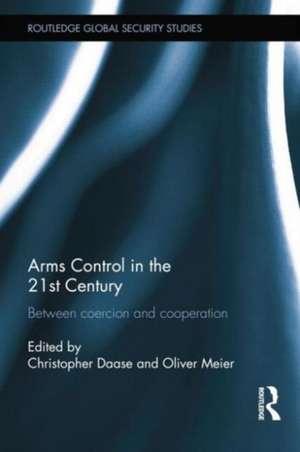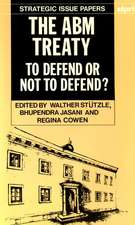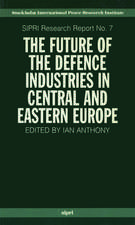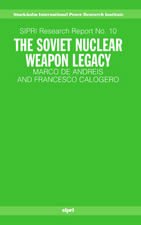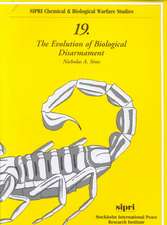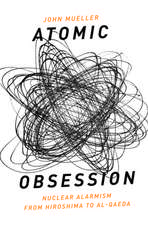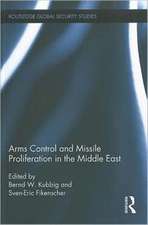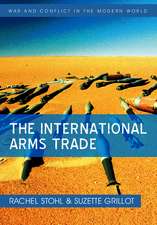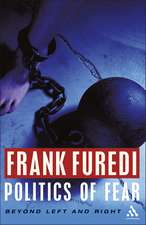Arms Control in the 21st Century: Between Coercion and Cooperation: Routledge Global Security Studies
Editat de Oliver Meier, Christopher Daaseen Limba Engleză Paperback – 10 mar 2014
A new paradigm in arms control is gradually replacing the idea that mutually agreed restrictions on armaments can improve international security. Thus, Hedley Bull’s classic definition of arms control as the "cooperation between antagonistic pairs of states in military affairs" needs to be amended by a new notion of coercive arms control as the set of non-cooperative and non-reciprocal measures to restrict the weapons or military capabilities of certain states.
This volume addresses the topic of how this ongoing paradigmatic shift will affect the effectiveness of arms control as a conflict management instrument.While some argue that new instruments can complement and strengthen traditional, multilateral and inclusive arms control regimes, others maintain that conflicts and contradictions between coercive and cooperative arms control regimes will severely limit their effectiveness. This volume provides a forum for academics and practitioners from around the globe to discuss these developments in depth and to assess the specific strengths and weaknesses of these new instruments of arms control.
This book will be of much interest to students of arms control, global governance, foreign policy and IR/Security Studies in general.
| Toate formatele și edițiile | Preț | Express |
|---|---|---|
| Paperback (1) | 311.48 lei 6-8 săpt. | |
| Taylor & Francis – 10 mar 2014 | 311.48 lei 6-8 săpt. | |
| Hardback (1) | 851.27 lei 6-8 săpt. | |
| Taylor & Francis – 3 iul 2012 | 851.27 lei 6-8 săpt. |
Din seria Routledge Global Security Studies
-
 Preț: 287.82 lei
Preț: 287.82 lei -
 Preț: 294.74 lei
Preț: 294.74 lei - 9%
 Preț: 1073.81 lei
Preț: 1073.81 lei -
 Preț: 326.49 lei
Preț: 326.49 lei -
 Preț: 325.30 lei
Preț: 325.30 lei -
 Preț: 462.81 lei
Preț: 462.81 lei -
 Preț: 492.53 lei
Preț: 492.53 lei -
 Preț: 465.53 lei
Preț: 465.53 lei -
 Preț: 130.92 lei
Preț: 130.92 lei -
 Preț: 481.58 lei
Preț: 481.58 lei - 14%
 Preț: 337.39 lei
Preț: 337.39 lei - 26%
 Preț: 820.71 lei
Preț: 820.71 lei -
 Preț: 416.96 lei
Preț: 416.96 lei - 18%
 Preț: 1052.85 lei
Preț: 1052.85 lei - 18%
 Preț: 1111.90 lei
Preț: 1111.90 lei - 28%
 Preț: 821.53 lei
Preț: 821.53 lei - 18%
 Preț: 1055.51 lei
Preț: 1055.51 lei - 16%
 Preț: 335.12 lei
Preț: 335.12 lei - 13%
 Preț: 324.86 lei
Preț: 324.86 lei - 18%
 Preț: 713.18 lei
Preț: 713.18 lei - 28%
 Preț: 821.14 lei
Preț: 821.14 lei - 18%
 Preț: 729.62 lei
Preț: 729.62 lei - 28%
 Preț: 851.27 lei
Preț: 851.27 lei - 18%
 Preț: 1165.87 lei
Preț: 1165.87 lei - 28%
 Preț: 825.25 lei
Preț: 825.25 lei - 18%
 Preț: 1112.21 lei
Preț: 1112.21 lei - 49%
 Preț: 542.69 lei
Preț: 542.69 lei - 18%
 Preț: 1071.66 lei
Preț: 1071.66 lei - 25%
 Preț: 852.88 lei
Preț: 852.88 lei -
 Preț: 430.37 lei
Preț: 430.37 lei - 18%
 Preț: 1118.46 lei
Preț: 1118.46 lei - 28%
 Preț: 819.50 lei
Preț: 819.50 lei - 18%
 Preț: 1057.40 lei
Preț: 1057.40 lei -
 Preț: 413.33 lei
Preț: 413.33 lei - 25%
 Preț: 826.68 lei
Preț: 826.68 lei - 30%
 Preț: 849.29 lei
Preț: 849.29 lei - 18%
 Preț: 1060.25 lei
Preț: 1060.25 lei - 18%
 Preț: 1123.68 lei
Preț: 1123.68 lei - 28%
 Preț: 820.16 lei
Preț: 820.16 lei
Preț: 311.48 lei
Preț vechi: 363.70 lei
-14% Nou
Puncte Express: 467
Preț estimativ în valută:
59.61€ • 62.00$ • 49.21£
59.61€ • 62.00$ • 49.21£
Carte tipărită la comandă
Livrare economică 14-28 aprilie
Preluare comenzi: 021 569.72.76
Specificații
ISBN-13: 9781138789418
ISBN-10: 1138789410
Pagini: 264
Ilustrații: 9 black & white tables, 1 black & white line drawings
Dimensiuni: 156 x 234 x 18 mm
Greutate: 0.41 kg
Ediția:1
Editura: Taylor & Francis
Colecția Routledge
Seria Routledge Global Security Studies
Locul publicării:Oxford, United Kingdom
ISBN-10: 1138789410
Pagini: 264
Ilustrații: 9 black & white tables, 1 black & white line drawings
Dimensiuni: 156 x 234 x 18 mm
Greutate: 0.41 kg
Ediția:1
Editura: Taylor & Francis
Colecția Routledge
Seria Routledge Global Security Studies
Locul publicării:Oxford, United Kingdom
Public țintă
Postgraduate, Professional, and UndergraduateCuprins
Preface Part I: Introduction 1. Introduction, Christopher Daase and Oliver Meier Part II: Is there a Paradigm Shift in Arms Control? 2. The Changing Role of Arms Control in Historical Perspective, Alyson JK Bailes 3. Non-Cooperative Arms Control, Oliver Meier 4. Coercion and the Informalization of Arms Control, Christopher Daase Part III: Effectiveness and Legitimacy of New Arms Control Instruments 5. The Effectiveness and Legitimacy of the Use of Force to Prevent Nuclear Proliferation, Martin B. Malin 6. The Role of Sanctions in Non-Proliferation, Michael Brzoska 7. The Proliferation Security Initiative: Effective Multilateralism or "Smoke and Mirrors"?, Ian Davis Part IV: Prospects for a New Arms Control Agenda – Diverging Views 8. A Non-Proliferation (r)Evolution:US Arms Control and Non-Proliferation Policy under Bush and Obama, Caroline Fehl 9. A New Transatlantic Approach? A View from Europe, Gerrard Quille 10. Prospects for a New Arms Control Agenda: An Indian Perspective, Arundhati Ghose 11. Prospects for a New Arms Control Agenda: View from the Middle East, Emily B. Landau Part V: Conclusion 12. The Changing Nature of Arms Control and the Role of Coercion, Christopher Daase and Oliver Meier
Notă biografică
Oliver Meier is a senior researcher with the Institute for Peace Research and Security Policy at the University of Hamburg, and the International Representative and Correspondent of the US Arms Control Association.
Christopher Daase is Professor for International Organization at the University of Frankfurt.
Christopher Daase is Professor for International Organization at the University of Frankfurt.
Descriere
This volume evaluates the impact of coercive arms control efforts to curb the spread of weapons of mass destruction in the twenty-first century.
